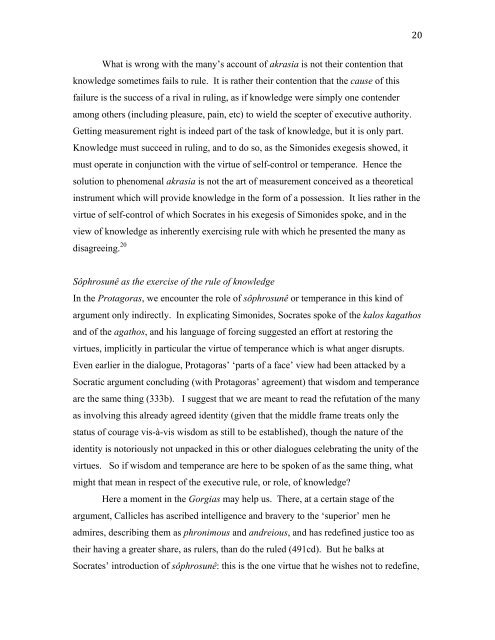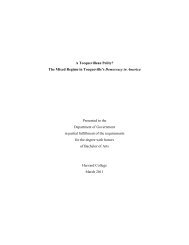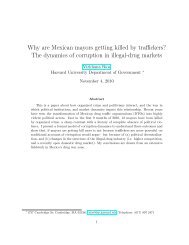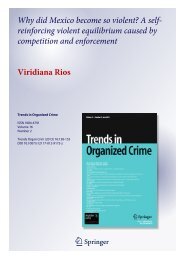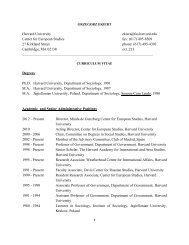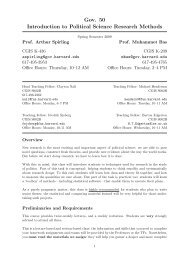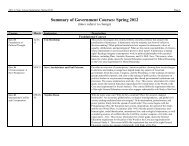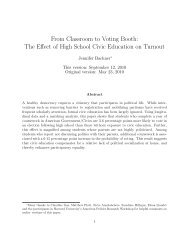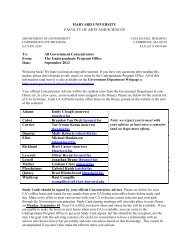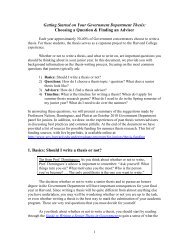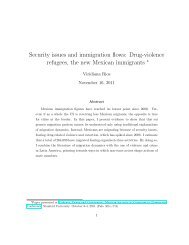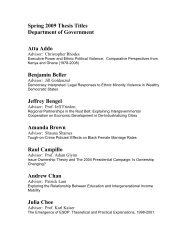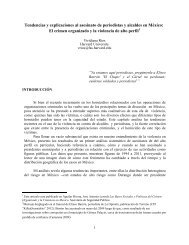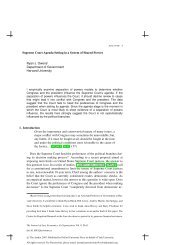1 Harvard University Political Theory Colloquium For 11 March 2010 ...
1 Harvard University Political Theory Colloquium For 11 March 2010 ...
1 Harvard University Political Theory Colloquium For 11 March 2010 ...
Create successful ePaper yourself
Turn your PDF publications into a flip-book with our unique Google optimized e-Paper software.
20 <br />
What is wrong with the many’s account of akrasia is not their contention that<br />
knowledge sometimes fails to rule. It is rather their contention that the cause of this<br />
failure is the success of a rival in ruling, as if knowledge were simply one contender<br />
among others (including pleasure, pain, etc) to wield the scepter of executive authority.<br />
Getting measurement right is indeed part of the task of knowledge, but it is only part.<br />
Knowledge must succeed in ruling, and to do so, as the Simonides exegesis showed, it<br />
must operate in conjunction with the virtue of self-control or temperance. Hence the<br />
solution to phenomenal akrasia is not the art of measurement conceived as a theoretical<br />
instrument which will provide knowledge in the form of a possession. It lies rather in the<br />
virtue of self-control of which Socrates in his exegesis of Simonides spoke, and in the<br />
view of knowledge as inherently exercising rule with which he presented the many as<br />
disagreeing. 20<br />
Sôphrosunê as the exercise of the rule of knowledge<br />
In the Protagoras, we encounter the role of sôphrosunê or temperance in this kind of<br />
argument only indirectly. In explicating Simonides, Socrates spoke of the kalos kagathos<br />
and of the agathos, and his language of forcing suggested an effort at restoring the<br />
virtues, implicitly in particular the virtue of temperance which is what anger disrupts.<br />
Even earlier in the dialogue, Protagoras’ ‘parts of a face’ view had been attacked by a<br />
Socratic argument concluding (with Protagoras’ agreement) that wisdom and temperance<br />
are the same thing (333b). I suggest that we are meant to read the refutation of the many<br />
as involving this already agreed identity (given that the middle frame treats only the<br />
status of courage vis-à-vis wisdom as still to be established), though the nature of the<br />
identity is notoriously not unpacked in this or other dialogues celebrating the unity of the<br />
virtues. So if wisdom and temperance are here to be spoken of as the same thing, what<br />
might that mean in respect of the executive rule, or role, of knowledge?<br />
Here a moment in the Gorgias may help us. There, at a certain stage of the<br />
argument, Callicles has ascribed intelligence and bravery to the ‘superior’ men he<br />
admires, describing them as phronimous and andreious, and has redefined justice too as<br />
their having a greater share, as rulers, than do the ruled (491cd). But he balks at<br />
Socrates’ introduction of sôphrosunê: this is the one virtue that he wishes not to redefine,


